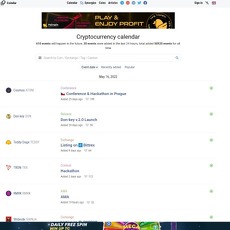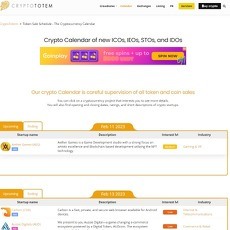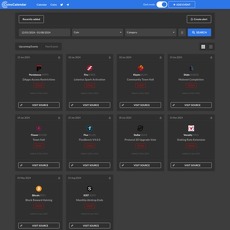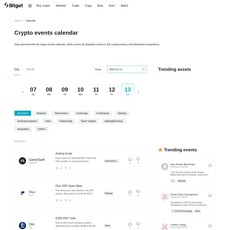Best Crypto Events Calendars (Listings, ICOs & Airdrops)
Keeping track of the happenings in the crypto world is not an easy task. There are lots of events and activities scheduled on a daily in various parts of the world, let alone developments and upgrades recorded on different blockchains and projects. Owing to the influx of events in the crypto space and how difficult it is to track them, participants have begun to enlist the help of calendars to update them at all times. These tools, popularly called cryptocurrency calendars, have emerged as one of the must-haves for every crypto practitioner who are serious about staying up-to-date in the crypto space.
In this article, we will explore the workings of cryptocurrency calendars, highlight some of the features they should provide, and introduce you to our list of best cryptocurrency calendars.
What Is A Crypto Calendar?
There are no limits as to what a crypto calendar should avail. These platforms do everything from updating users on crypto events, to provide ICO alerts, or listing crypto news. Whatever it is that a crypto calendar specializes in, it must cater to the needs of users by allowing them to personalize their calendar by providing developments, news, ICOs, and events that are most crucial to them. In light of all the points raised, we could define a cryptocurrency calendar as a platform where crypto participants can access all the information on future and present happenings in the crypto space.
While this definition encapsulates the broader functionalities of a typical crypto calendar, it does not, however, pinpoint the different reasons why people opt for these tools. These reasons are:
They Help Users Track Upcoming and Past Events
The crypto community has an affinity for organizing workshops, conferences, and launch events. As expected, a crypto events calendar compiles an array of cryptocurrency upcoming events, segment them according to their locations or dates, and allow users to access them at any time. That said, a top crypto calendar does not just list events, it also includes important details relating to the theme of the events, the speakers and guests, or even the projected lowdown of the program from the beginning to the end.
Also, these platforms might offer users a report of past events. So, you could just read through these reports and check out the highlights of events. This feature is invaluable to bloggers, news platforms, and other information portals. These sets of professionals can use crypto calendar’s recaps as sources for their news and blog posts.
They Help Track Cryptocurrencies
The development teams of cryptocurrencies have setup roadmaps that would help them time upgrades, project launch dates, and coin listing. Though it is difficult to track events, monitoring roadmaps is even trickier. That is why a crypto coin calendar has gone to great lengths to enable resources that would help you keep an eye on the proceedings of your favorite coins. With this, you won’t miss a thing as regards the crypto upgrades, hard forks, Mainnet/Testnet launch, or events sponsored by the coin’s community or the development team.
You Can Track Exchanges Too
Apart from cryptocurrencies, you can filter the crypto calendar’s search engine to access activities relating to one or more exchanges. Here, you can receive alerts on new listings and keep an eye on IEOs availed on exchanges, as well as get updates on other events relating to exchanges, on a crypto market calendar. As such, it becomes easier to factor in crucial details that could affect market trends, especially if you trade on large and popular crypto exchanges.
You Could Get All the Icos Updates You Need
Some crypto calendars offer users ICO alerts. Hence, instead of going through several websites to get factual information on upcoming ICOs, you can just pick a crypto calendar that tracks ICOs and get all your research done on one spot.
They Also Track News
It goes without saying that with all the features mentioned so far, a crypto calendar can easily pass for a crypto news aggregator. This notion holds as a typical crypto news calendar utilizes different methodologies to ensure that their platforms have a plethora of information relating to crypto technology and its economy. While a high percentage of crypto calendars stick to the features mentioned above, some go the extra mile to avail crypto news via their blogs. Thereby, establishing them as the one-stop site for crypto participants when it comes to fetching information.
Having listed the core features you would likely find on crypto calendars, the next section discusses some of the methods these platforms use to collate events.
How Do Crypto Calendars Verify Events?
From our understanding of the technicalities of crypto calendars, some of these platforms have unique ways to get people updated on crypto events. For one, some rely on a community-based system where individuals or organizations can add an event and produce evidence, while other users vote to verify the authenticity of the information. For instance, you could choose to post about an upcoming event, which would have to undergo a voting process before it can get showcased on the platform. Once you add the events, people could either upvote or downvote it. The percentage of upvotes relative to the downvotes will determine whether your event would feature on the website.
On the other hand, some rely on a more centralized procedure where the platform gets to do all the verification and pick the events that eventually become accessible to their users. As expected, both methodologies have their weaknesses and strengths. For one, the community-based format relies on the willingness of users to contribute to the verification process, which bodes well for a crypto calendar with a strong user base and active users. However, for a calendar with none of these requirements, verifying the authenticity of events might prove to be an undaunting task.
That said, crypto calendars that lean on a centralized algorithm might capitalize on their autonomy over the entirety of the process to include events that wouldn’t have made the caught.
What Are the Factors You Should Consider When Considering to Adopt A Crypto Calendar?
Several details should come to play in your research for the best crypto calendars available in the market. These factors are:
The Speed at Which the Platform Updates Users
Perhaps, the most important factor to consider is the speed at which the platform updates its feeds. It is frustrating when you get an alert regarding an interesting event a week before the date it kickoffs. It leaves you little time to prepare. Hence, we advise that you verify the crypto calendar’s propensity to offer updates weeks ahead of the scheduled date of commencement. The same is true for ICOs updates, exchange listings, and coins upgrades alert. All in all, always go for calendars that puts you a step ahead of the dynamic crypto landscape.
Is the Platform Able to Feed You Details Relating to Your Chosen Coin?
While there is a growing number of cryptocurrencies available in the market, chances are, you only have interests in a few, especially those in your portfolio. As such, it is a total waste of time if your coin calendar does not avail features to filter your calendar to focus on your chosen coin. The essence of utilizing these tools is to receive updates on upgrades, possible listings, and mainnet/testnet launch dates. Therefore, you had better opt for crypto calendars that do not only fixate on popular coins but provide services to a broader crypto community.
How Effective Is the Platform’s Alerting Systems?
There is no doubt that the alerting systems of a crypto calendar are paramount to your research. You ought to identify the type of alerts available on the platform as well as their efficacies. In most cases, crypto calendars offer email alerts or notifications. And these alerts should cut across all of the updates that the platform avails. In other words, the crypto calendar should offer alerts and reminder features for updates relating to events, ICOs, news, coins, and exchanges.
The Design of The Crypto Calendar’s Website
Even though your chosen crypto calendar does remarkably well to offer all of these features mentioned earlier in this post and yet does not have the right design, chances are, you might encounter a few snags along the way. Your chosen crypto calendar needs to incorporate a design that is appropriate for a website that houses a lot of information and content. A poorly structured crypto calendar can make it a tad difficult for users to navigate and find resources easily. And so, you should only go for crypto calendars that utilize a simple layout, where features and contents are arranged accordingly, to help users navigate the website seamlessly.
Although this is vital to user experience, it also allows beginners or new visitors to enjoy everything the platform has got to offer. It also helps if the crypto calendar offers mobile apps, as it makes the whole process a lot faster and easier.
The Verification Method of Platform
Recall that we highlighted two modes of verification that crypto calendars often adopt. Hence, you ought to verify the type of verification method at work on your favorite crypto calendar. Doing this will help you determine if there are loopholes, which the team behind the platform or other users can capitalize on. For one, you must ascertain that the platform has the right resources in place as regards size and active members, particularly if it adopts a community-based evidence authentication process. On the other hand, you should check that a centralized crypto calendar has established an authentication system that is void of manipulations.
The ability of the crypto calendar to enable a flawless system would determine the validity of the events it posts. You do not want to utilize a compromised platform and base your crypto schedules or activities on fake events.
The Security of The Crypto Calendar
It is vital to identify the security status of a crypto calendar before incorporating its services. The questions that you should be asking is: Does the crypto calendar has the capacity to secure my private details? That said, you should explore the contents of the website to verify that it does not prioritize sponsored content over users’ safety. Besides, you should avoid crypto calendars that incorporate a lot of advertisements. Apart from the obvious security threat that this causes, it limits user experience.
How Did Cryptolinks Compile Its List of Best Crypto Calendars?
Having explored all of the factors that should guide you when looking to choose a crypto calendar, this section introduces you to our list of best crypto calendars and how we reached this conclusion.
First, we took a look at the specialty of the crypto calendar and the number of coins it supports. It made a lot of sense to rate a crypto calendar that supports a wide array of cryptocurrencies over the ones that could only track a handful of coins. Then, we gauged the speed it took each crypto calendar to update users. Needless to say, websites with lagging algorithms had no place on our list. While carrying out these checks, we ensured that the platform has a valid system in place to verify the sources of details regarding upcoming events. It was important to note whether the crypto calendar accepts events sourced on forums and the likes. Or whether it would rather require that evidence comply with strict provisions, whereby official information from twitter or LinkedIn accounts had to serve as valid evidence.
Thereafter, we took a look at each platform’s alerting system and how efficient they were. Also, we rated each’s website design and how easy it was for users to navigate its content. Crypto calendars with mobile apps ranked better than those that did not offer a mobile experience. This stance stemmed from the notion that crypto calendars are platforms, which should offer users the liberty to access their services on the go.
After exploring the design of each website, we went on to analyze their security features. In this analysis phase, we ensured that the website is secure. Likewise, we examined each platform’s propensity to post events relating to scam projects. As well, we leaned towards crypto calendars, which put a cap on the number of advertisements incorporated on their sites.
At the end of this rigorous process, we found 7 crypto calendars worth mentioning on our platform. As always, we included the pros and cons of each platform in their separate reviews, and we advise that you read through these reviews before opting for any one of them.






